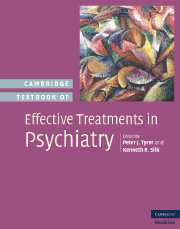Book contents
Preface
Published online by Cambridge University Press: 12 May 2010
Summary
All professionals in mental health want to give the best treatments for their patients, but how do we judge what is really best in a specific instance? The decisions about treatment are individual ones and yet the evidence in the literature is necessarily derived from groups, the larger the better. In editing this book we have tried to remember that, every time we make a treatment suggestion or recommendation, a busy clinician is tugging at our sleeve and asking ‘how will this help me in treating my patient, who differs from others in having X, Y and Z?’ We are both practising clinicians and are tuggers ourselves. We realise that evidence-based medicine (EBM), although it now trips easily off the tongue, is not nearly as straightforward as it may first appear. Real patients are seldom the same as those who are described in textbooks. Even at best, they only approximate to the sort of people who are described in good trials of evidence. We also have to remind ourselves that there must be hundreds of effective treatments that have not yet been shown to be effective, but this does not mean that clinicians should be deprived of their value because no one has done the hard work necessary to show that they are effective.
We are also fully aware that most of the evidence of efficacy comes from simple treatments such as drugs, which are much easier to evaluate than complex treatments, including most of the psychological therapies.
- Type
- Chapter
- Information
- Cambridge Textbook of Effective Treatments in Psychiatry , pp. xix - xxPublisher: Cambridge University PressPrint publication year: 2008



